April 9 to April 15
Former foreign minister George Yeh (葉公超) was pleased with his 1957 visit to the Middle East, especially because many leaders in the region had promised to visit Taiwan.
This was a big deal as the government desperately needed international support to secure its claim as the rightful ruler (in exile) of China. But there was one problem — the largest place of worship for Muslims in Taipei was a 300-ping (about 992m2) converted Japanese-style house on Lishui Street, which Yeh concluded was in no shape to house foreign dignitaries.
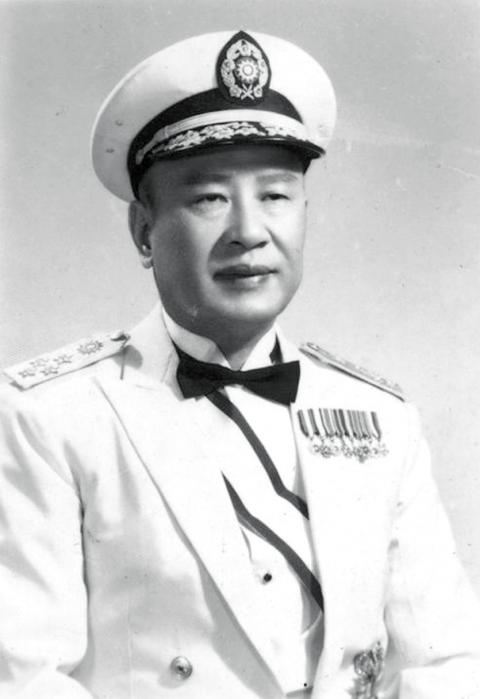
Photo courtesy of Wikimedia Commons
Once back in Taipei, Yeh and famed general Pai Chung-hsi (白崇禧), who was the head of the Chinese Muslim Association, advocated for the construction of a proper mosque. With the government’s help and donations from Jordan, Turkey, Iraq and Iran, the Taipei Grand Mosque was dedicated on April 13, 1960.
“After the mosque was complete, we hung photos of leaders of various Islamic countries on the walls … It’s very important to use religious ties to facilitate diplomacy,” Pai says in an oral history compilation by Academia Sinica.
MUSLIMS IN TAIWAN’s HISTORY
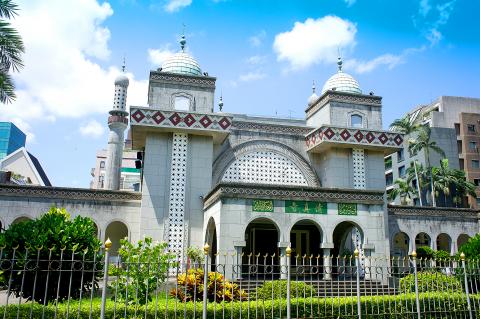
Photo courtesy of Wikimedia Commons
Pai’s ancestors had followed the Islamic faith since the Yuan Dynasty. He was among about 20,000 Chinese Muslims who fled to Taiwan with the Chinese Nationalist Party (KMT) after the Chinese Civil War.
While there had been Muslims in Taiwan since the 1600s, most of them had largely lost their identity by then, assimilating in to mainstream Han Chinese culture. According to Dru Gladney’s book, Chinese Muslims, which includes a brief section on Taiwan, the original “Taiwanese Muslims” arrived with Ming Dynasty loyalist Cheng Cheng-kung (鄭成功, also known as Koxinga) in the mid-1600s, as he sought to use Taiwan as a base to defeat the Qing Empire.
There were almost certainly other sources of migration, Gladney writes. During the Tang Dynasty, Quanzhou in Fujian Province was one of the four major ports open to foreign trade in China. During the Yuan Dynasty, many Arab or Persian traders settled in the area, which directly faced Taiwan and later became a major source of migration. These migrants included the descendents of merchants or the descendants of those whom they converted, bringing their religion and way of life to Taiwan. A report by the Taiwan Society of Anthropology and Ethnology adds that many Muslims made up the Qing Dynasty army sent to Taiwan to defeat Koxinga’s grandson, with many settling down after the victory.
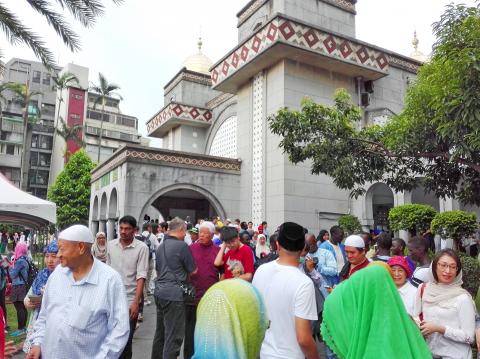
Photo courtesy of Wikimedia Commons
When Gladney visited Taiwan in 1995, he found that these “Taiwanese Muslims” no longer practiced Islam, though some groups still retained vestiges of the faith, such as not using pork when worshipping ancestors.
In addition to Han Chinese assimilation, Gladney writes that Japanese discouragement of foreign religions during the colonial era (1885-1945) hastened the loss of their Islamic identity. Furthermore, while in China, Han Chinese Muslims were assigned a separate ethnic identity, this was not the case in Taiwan after the KMT retreat, further assimilating them into mainstream society.
Even with his group of newly-arrived Muslims, Pai was worried that they would also eventually lose their identity.
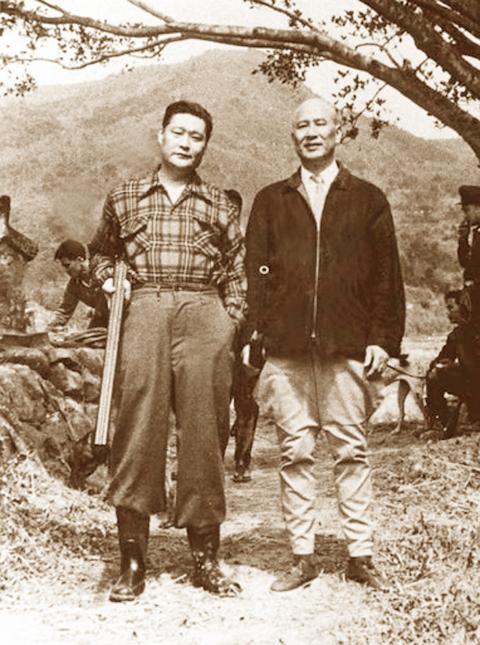
Photo courtesy of Wikimedia Commons
“I’m not sure how it is in other countries, but Islam has not promoted itself enough in China, and it’s the same situation in Taiwan,” he says. “We should let everyone know about our doctrine and practices. Even when we pray, our elders will often read the scripture in Arabic without translating. My generation already lost a lot of knowledge due to the various wars in China, and now the next generation will know even less.”
Indeed, today’s Muslims in Taiwan are mostly foreign nationals hailing from Indonesia and other countries.
GLORY DAYS
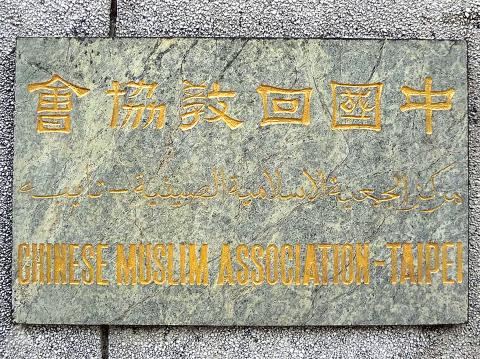
Photo courtesy of Wikimedia Commons
In 1948, Chang Tzu-chun (常子春) and Cheng Hou-jen (鄭厚仁) were sent to Taiwan by the Chinese Muslim Association to set up a local branch. To serve the newly arrived Muslims from China, they converted the aforementioned Japanese-style house into a temporary place of worship.
There were few resources on Islam in Chinese, and this group, especially Chang Tzu-hsuan (常子萱), spent three hours a day for seven years translating and editing the Koran.
Despite its modest headquarters, the association put a lot of energy into promoting Islam through radio broadcasts and books, even establishing a magazine.
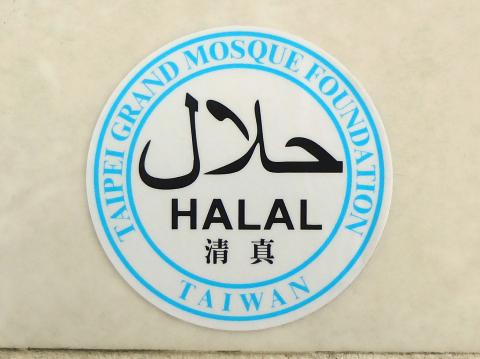
Photo courtesy of Wikimedia Commons
The house soon became crowded with new immigrants, which led to the construction of the new, much more spacious mosque.
According to the book History of Muslims in Taiwan (台灣回教史), by Chia Fu-kang (賈福康), the dedication ceremony was attended by then vice-president Chen Cheng (陳誠), the heads of major government departments as well as representatives from various countries abroad. Clad in all white, the local Muslim leaders recited prayer, with the Sultan of Brunei reading the first chapter of the Koran.
According to Chia, a significant event was the visit of King Faisal of Saudi Arabia in May, 1971. By that time, Taiwan’s international position was becoming increasingly shaky, and five months after the King’s visit, the nation was out of the UN. While many countries were turning away from Taiwan, Saudi Arabia announced its support and the king visited for four days. The Taiwanese Muslims seemed overjoyed that even though the king had only been scheduled to visit the mosque for 10 minutes, he stayed for an hour.
As these leaders passed away, and as exchanges with Muslim countries decreased due to international isolation, Islam saw a sharp decline in Taiwan in the 1980s. However, as history has shown, there would be new immigrants to come to keep the religion alive.
Taiwan in Time, a column about Taiwan’s history that is published every Sunday, spotlights important or interesting events around the nation that have anniversaries this week.

April 14 to April 20 In March 1947, Sising Katadrepan urged the government to drop the “high mountain people” (高山族) designation for Indigenous Taiwanese and refer to them as “Taiwan people” (台灣族). He considered the term derogatory, arguing that it made them sound like animals. The Taiwan Provincial Government agreed to stop using the term, stating that Indigenous Taiwanese suffered all sorts of discrimination and oppression under the Japanese and were forced to live in the mountains as outsiders to society. Now, under the new regime, they would be seen as equals, thus they should be henceforth

Last week, the the National Immigration Agency (NIA) told the legislature that more than 10,000 naturalized Taiwanese citizens from the People’s Republic of China (PRC) risked having their citizenship revoked if they failed to provide proof that they had renounced their Chinese household registration within the next three months. Renunciation is required under the Act Governing Relations Between the People of the Taiwan Area and the Mainland Area (臺灣地區與大陸地區人民關係條例), as amended in 2004, though it was only a legal requirement after 2000. Prior to that, it had been only an administrative requirement since the Nationality Act (國籍法) was established in

Three big changes have transformed the landscape of Taiwan’s local patronage factions: Increasing Democratic Progressive Party (DPP) involvement, rising new factions and the Chinese Nationalist Party’s (KMT) significantly weakened control. GREEN FACTIONS It is said that “south of the Zhuoshui River (濁水溪), there is no blue-green divide,” meaning that from Yunlin County south there is no difference between KMT and DPP politicians. This is not always true, but there is more than a grain of truth to it. Traditionally, DPP factions are viewed as national entities, with their primary function to secure plum positions in the party and government. This is not unusual

US President Donald Trump’s bid to take back control of the Panama Canal has put his counterpart Jose Raul Mulino in a difficult position and revived fears in the Central American country that US military bases will return. After Trump vowed to reclaim the interoceanic waterway from Chinese influence, US Defense Secretary Pete Hegseth signed an agreement with the Mulino administration last week for the US to deploy troops in areas adjacent to the canal. For more than two decades, after handing over control of the strategically vital waterway to Panama in 1999 and dismantling the bases that protected it, Washington has